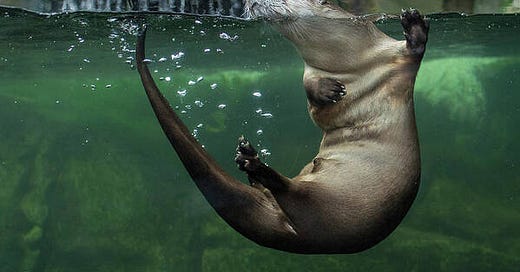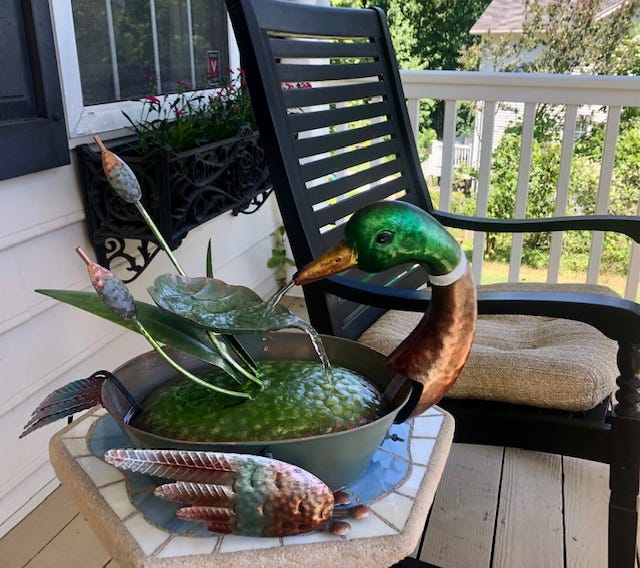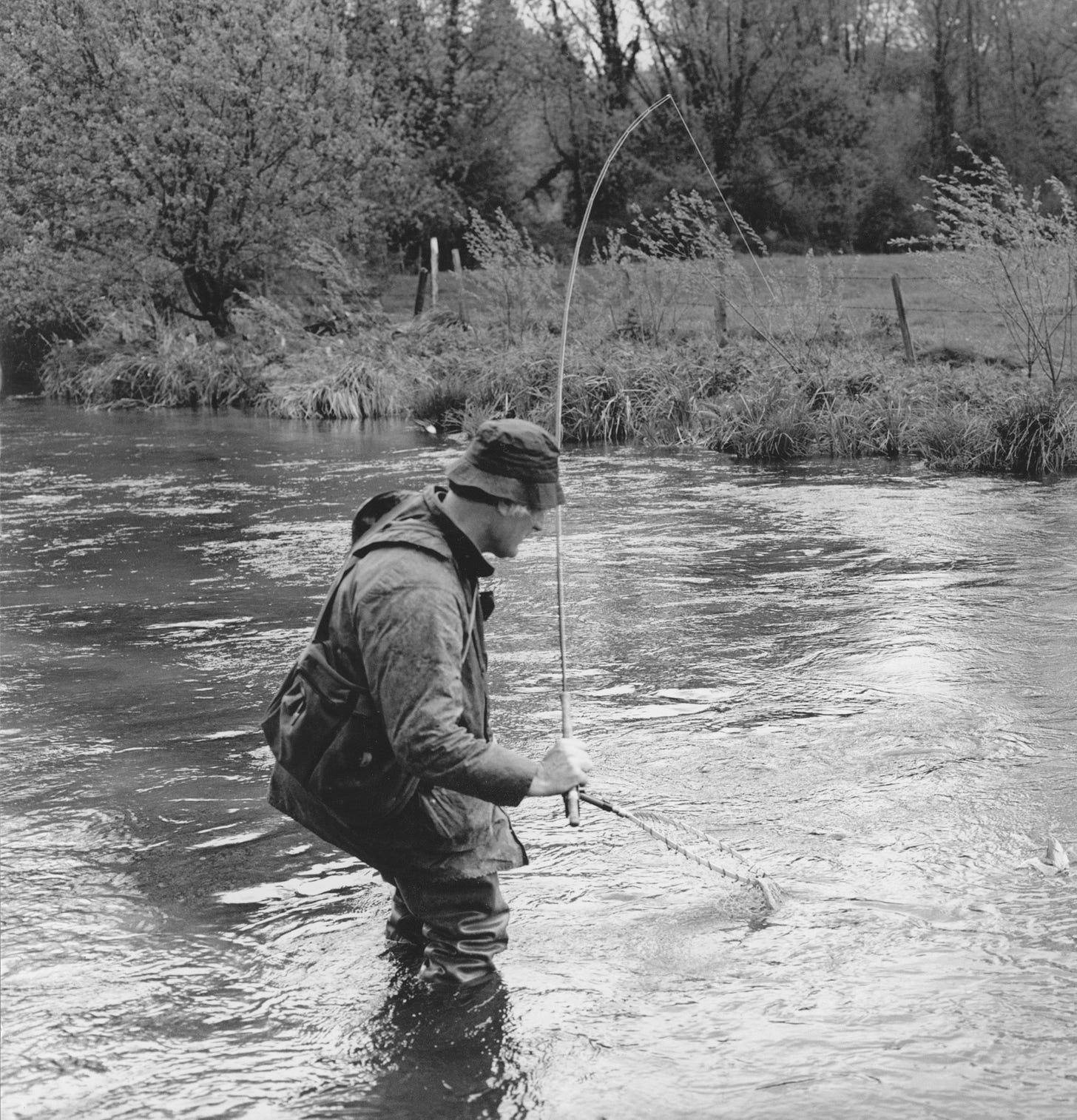Editor’s Note: Have a question about those swollen lymph nodes? Matt is not a doctor, even if he often says, “Get me 10 cc’s of epinephrine, stat!” (He watched a lot of St. Elsewhere as an impressionable youth.) But do get those checked out by a medical professional. For all other questions, Ask Matt at askmattlabash@gmail.com.
Dear Matt,
I believe it’s essential, as a responsible citizen who fears for her country, to stay well-informed. But the news is so unremittingly depressing, that I also want to check out and ignore it altogether. What’s the right course of action?
Perplexed,
Adele P.
Well the good news, if you’re a misery-loves-company type (and who isn’t?), is that they’ve been making bad news for as long as there’s been news. It just arrives at our doorstep faster and by more delivery mechanisms now. In the old days, it could take a while for Thag to break word to the rest of the caveman collective that the mammoth meat had spoiled. Now, when something disastrous happens, such as say, Marjorie Taylor Greene speaking in public, we are all immediately alerted and alarmed by the little rectangular Klaxon-of-doom in our pockets. The 5G contraption that is irradiating our minds just as it is our genitals.
It’s good to know things. But sometimes, it can be detrimental to know too much at all times. As the Ecclesiastes author put it, “He that increaseth knowledge increaseth sorrow.” This is not an excuse to check out. But you should stay checked in with some mental-health caveats.
First, get some perspective and don’t flatter yourself. No matter how bad the news is — and I fully admit it has been seemingly awful for the last many years — it has been worse, and it will get worse, still. Every generation tends to think they are living in the Final Days, that we’re all washed up as a species, and we’re hastening our own demise. Which I’m totally prepared to believe, by the way, because I read lots of AI stories. The technology’s purveyors seem to care about little besides pure, naked profit, on their way to making humanity redundant.
My fishing pal, The Cool Refresher, wrote this to me on the occasion of the 80th anniversary of D-Day/the recent rash of troubling AI stories:
Not to get too predictable but aren’t we at the end of the Fourth Turning? We are {relatively} rich kids whose parents won the war and made a ton of money, but all we did was backpack through Europe and get hooked on drugs. Our generation(s) has enjoyed the luxury of selfishness…there’s no longer a unifying spirit driving us forward, just our little altars to ourselves (aka iPhones) that we spend all our spare time on.
I agree with him, of course. He’s utterly right about how far we’ve fallen. But humanity has always been fallen. That’s what makes us Homo sapiens. What other species is capable of producing something as vile as Pol Pot, Ted Bundy, or Steve Bannon? The war my beloved grandfather helped win — the one many regard as the last righteous war — put a stop to the Holocaust (6 million dead), while also obliterating a couple cities with the atom bomb, filled mostly with civilians (add about another 129,000-to-226,000 to the death toll). Even historically clean narratives are messy, when you bother with the particulars.
And of course, aside from World War II, people had good cause to think the sky was falling if they managed to live through The Plague of Justinian (541-549 AD — a bubonic plague outbreak thought to have killed up to 100 million people). Or the Mongol Conquests of the 13th and 14th centuries, which resulted in widespread carnage across Eurasia, thought to have offed ten percent of the world’s population at the time. Then there was the ultimate scourge: the Great Boy Band Scare of the late ‘90s/early 2000s. We all had reason to think the sun was about to flicker out in the sky as the rivers ran red with blood. Does anyone remember LFO? (An acronym for “Lyte Funky Ones.”) I do. Their song, “Summer Girls,” which reached number three on the Billboard charts in 1999, might have contained the greatest lyrical atrocity of all-time:
Stayed all summer then went back home
Macaulay Culkin wasn't Home Alone
Fell deep in love but now we ain't speakin’
Michael J. Fox was Alex P. Keaton
When I met you, I said my name was Rich
You look like a girl from Abercrombie & Fitch
So dopey, I actually had to take their poster off my wall.
We’ve been teetering on the brink many times before. And yet, here we are again, pretending like liberals going woke or Donald J. Trump being a felonious retard is going to end our existence. (I’m not very woke, myself, so sincere apologies to any retarded readers, or felons — I don’t mean to besmirch by association.)
We need to stay cognizant of the incontrovertible fact that for as long as humans have been drawing breath, bad things happen to good people, bad things happen to bad people, and bad things happen to all people. Bad things are pretty democratic that way.
This doesn’t mean we shouldn’t stay alert and resist the badness where possible. But when it feels like every other person around you has lost their sanity, sometimes your first order of business is to preserve your own. Be a light unto the darkness, a beacon of sanity when there’s none to be had.
Because of the nature of my gig, I have to hold my head underwater a fair amount, submerging myself in the insanity. Occasionally, I get despondent. More often, I get angry. Furious, even. And sometimes, I let that anger bleed onto the page — deliberately so. But however crazy I let the news drive me, it isn’t ultimately the news’s fault, but my own. Not to get grandiose, but I view it as my duty to stay sane, as much and as often as I possibly can. To cut my own uncharitable impulses by half, or maybe just a fourth. (Baby steps.) To take a breath after having my face held in the muck. To claw back at least a little perspective.
I do this by getting outside as often as possible. Because when you get next to nature, you’re no longer fighting abstract realities in your rectangle of doom, but confronting the physical realities right in front of your face. Realities that are often indifferent to you or your opinions, but that can envelop and preserve you, nonetheless. When you attune yourself to nature’s rhythms, you shed the unnatural rhythms that the rest of life inflicts.
Just a few days ago, I was growing agitated and irritable about all the god-awful news, since I’m a big believer in truth, and it doesn’t seem to be getting told much lately. So I did something very simple. I took medicine that after years of usage, I already know works. (No, not alcohol.) Though I didn’t feel like it, I forced myself outside with my fly rod. Not to some glamorous locale, but to a nearby layup pond. I caught a mess of largemouth bass and crappie, kissing every one before I set them loose. (Platonically, like you’d kiss your aunt, not your hot fourth cousin.) And not because I’m some fish pervert. But because they aren’t just fish to me, but prompts. Slime-covered slivers of grace that remind me that there is a world beyond my fleeting concerns, and it is often a more beautiful one than the world my mind spends the bulk of its time choosing to inhabit. Then at dusk, I went out to my porch, and read something enriching, holding a deep pour of Kentucky sunshine over lots of ice. It was a hunting poem, from my late friend Timothy Murphy’s book, Hunter’s Log, called “Missouri Breaks”:
I am a trespasser on treeless ground,
home to the sharptail and the furtive Hun,
and here the tallest thing for miles around
is a small hunter shouldering his gun.
A blooded dog quarters the feral rye,
and my body’s long quarrel with my mind
is silenced by the landscape and a sky
legible as a Bible for the blind.
Maybe it’s not LFO (New Kids on The Block had a bunch of hits/Chinese food makes me sick/ And I think it’s fly when girls stop by/For the summer). But it works for me. I don’t hunt, but I don’t need to. Because I was just taken hunting — with Tim.
And I read these words next to a mallard fountain, bought for me years ago by my mom. It sits on my porch reading table. The reason I could never duck hunt, even if I were a hunter, is that they’re just too pretty to peg out of the sky. Puppies with wings, a remorseful duck-hunter friend once called them. It might sound cheesy to you, but I plug the water-spewing drake in, and turn it on. Because even though I’m not standing in a river, trying to molest fish, the moving water sets the words I’m reading to music, the sweetest kind they make. Moving water, as Jim Harrison said, being “forever in the present tense, a condition we rather achingly avoid.”
And now that it’s June, after dark, my wife and I head down to a stand of woods in our neighborhood, that has a slip of a stream running through it. There, the fireflies blink in the trees. A bug with the light of God in its ass, as I’ve written about at length in these pages before. And for a while, we talk about what we’re seeing. And then we don’t talk at all. Because nature has a way of doing that to you. Making words extraneous. A long breath after a hard day of asphyxiation.
So that is my advice. Take in the news, internalize it if you must, push back on it when necessary. And then get the hell away from it on a regular basis, and live to fight another day. The natural world will help you regulate your heartbeat, so that you don’t suffer from arrhythmia, or that it doesn’t stop outright. As E.M. Forster wrote: “"What is the good of your stars and trees, your sunrise and the wind, if they do not enter into our daily lives?"
These are insane times. So preserving your sanity isn’t a luxury, it’s a necessity. Consider it your job. And take your job seriously.
Bonus Poem: A buddy of mine, who I hadn’t talked to in a very long time, sent me a wonderful gift, recently. The kind only an old friend would send — Ted Hughes’s 1983 poetry collection, River. In which he dog-eared the poem that most spoke to him, and which hasn’t stopped speaking to me since. It’s called “That Morning.”
We came where the salmon were so many
So steady, so spaced, so far-aimed
On their inner map, England could add
Only the sooty twilight of South Yorkshire
Hung with the drumming drift of Lancasters
Till the world had seemed capsizing slowly.
Solemn to stand there in the pollen light
Waist-deep in wild salmon swaying massed
As from the hand of God. There the body
Separated, golden and imperishable,
From its doubting thought — a spirt-beacon
Lit by the power of the salmon
That came on, came on, and kept on coming
As if we flew slowly, their formations
Lifting us toward some dazzle of blessing
One wrong thought might darken. As if the fallen
World and salmon were over. As if these
Were the imperishable fish
That had the world pass away —
There, in the mauve light of drifted lupins,
They hung in the cupped hands of mountains
Made of tingling atoms. It had happened.
Then for a sign that we were where we were
Two gold bears came down and swam like men
Beside us. And dived like children.
And stood in deep water as on a throne
Eating pierced salmon off their talons.
So we found the end of our journey.
So we stood, alive in the river of light
Among the creatures of light, creatures of light.
Bonus Tracks: Here’s some Sunday-morning music. My two favorite tracks from Bob Dylan in D.A. Pennebaker’s 1967 Dylan documentary, Don’t Look Back. Two improvised gospel piano songs from an artist who didn’t spend much time on keys. In both, it feels like Dylan just tossing off lyrics while he plays. Even if you can’t understand a word — it wouldn’t be Dylan otherwise — give them a listen. They’ll make you feel clean.
And:






